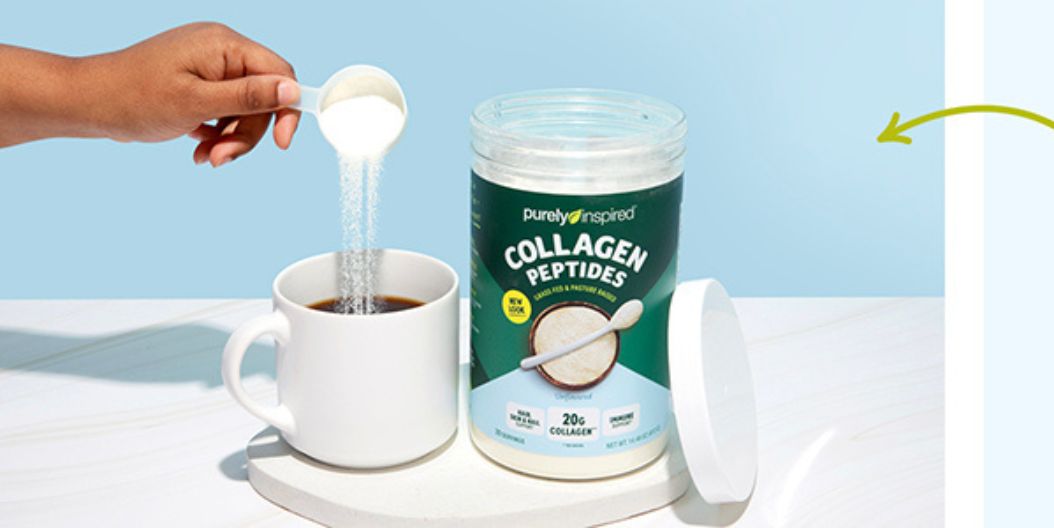Discover the truth behind whether or not collagen protein can be used to build muscle mass. Learn how this protein can help you reach your fitness goals and the unique mechanisms behind how it’s possible.
Did you know that collagen is one of the most abundant proteins in the human body? (1) Collagen protein is vital to various connective tissues in the human body, including skin, tendons, ligaments, and bones. (2)
If you are reading this article, you have been training hard in the gym and working towards building the physique you have always dreamed of or accelerating your athletic performance.
To do so, you are looking for a way to accelerate your lean muscle mass growth and a new addition to your daily routine beyond the common recommendations you hear in training circles.
Buy Organic Protein [Ask for Free Shipping]

Such as increasing calorie consumption, optimizing your protein sources with protein supplements, and consuming just the right amount of carbohydrates pre-and post-workout.
These are the "bread and butter" of training programs aiming to enhance muscle mass, as you cannot out-train a poor diet. But there are ways to add just one percent or more improvement to your nutritional protocol that can significantly increase skeletal muscle in the long term.
Consuming a collagen supplement may be just what you need to aid in the exercise-recovery effects of your workouts.
Also Read: Collagen Pills vs Powder - Which is Better & Why?
In this article, we will dive into collagen consumption's benefits and role in muscle recovery and connective tissue protein synthesis so that you can confidently add to your arsenal of dietary supplements and gain a competitive advantage in the gym.
Does Collagen Build Muscle?
According to several studies, collagen supplementation does not affect muscle protein synthesis or muscle size when combined with resistance training compared to milk-derived proteins such as whey (3)
See:
https://pubmed.ncbi.nlm.nih.gov/35042187/
https://pubmed.ncbi.nlm.nih.gov/31919527/
https://pubmed.ncbi.nlm.nih.gov/31895298/
This may surprise some as collagen is not a primary muscle-building protein for the human body like other types of protein, such as whey protein.
However, research supports the idea that collagen protein supplementation can play an additional role in your fitness goals such as supporting connective tissues.
Collagen's Role in Connective Tissue
Collagen plays an important role in supporting connective tissue, particularly tendons and ligaments. Tendons and ligaments connect muscles to bones and bones to each other, respectively, forming a network that facilitates the movement of our muscles.
After exercise, the role of collagen synthesis aids the repair and strengthening of these connective tissues. For example, in young adults, exercise when combined without collagen supplements boosts collagen protein synthesis above baseline, highlighting the remodeling of collagen protein after exercise. However, how does collagen supplementation affect our connective tissues after exercise?
See:
https://pubmed.ncbi.nlm.nih.gov/37202878/
https://pubmed.ncbi.nlm.nih.gov/15572656/
Below, we will dive into the benefits of collagen supplementation post-exercise.
Stimulating Protein Synthesis
Protein synthesis is the process of recovering from exercise and supporting recovery. When you step inside the gym to train, the goal is to perform exercises that break down muscle tissue so that protein synthesis is triggered, and your skeletal muscles and connective tissue repair and grow stronger.
See: https://www.ncbi.nlm.nih.gov/pmc/articles/PMC9086765/
Protein synthesis is stimulated by several factors, with the primary triggers being intense training, adequate protein present in the diet, and hormones like insulin and testosterone.
Based on research, one of the benefits of collagen supplementation post-exercise is that it can help kick-start this process and enhance the benefits of resistance exercise based on its rapid digestibility. (1)
Also Read:When is the Best Time to Take Collagen?
Increased Amino Acids
Amino acids are proteins' "building blocks" and can help increase muscle fiber size over time. These building blocks can be made by the body (non-essential), consumed via the food you eat, or supplemented via protein supplements you drink after training (essential).
By taking collagen protein supplements, amino acids found within the protein can be consumed at the right time to maximize the muscle-building response you get from training. (3)
Collagen molecules are exceptionally high in the amino acids' glycine, proline, hydroxyproline, and arginine which can contribute to muscle repair post-exercise.
After muscle fibers are damaged with each repetition, they require ample amino acids from protein sources to recover and rebuild. These amino acids are necessary for muscle repair and without them, muscle growth is not possible.
The combination of arginine and glycine also contributes to increased Creatine synthesis. (3) An increase in creatine allows for more energy or adenosine triphosphate (ATP) in the body (3).
More ATP results in more work being done in a single session, either through increased repetitions or weight. (3) Which can ultimately result in muscle mass improvements over time.
An uptick in creatine in the body also improves recovery post-exercise, allowing for more frequent or high-intensity training and more muscle mass to be built. (3)
Collagen Protein vs. Whey Protein
If you compare collagen protein to whey protein, you will find some similar aspects to these two types of proteins, but also definitive differences that set them apart.
Both proteins are rapidly digesting, meaning when you consume them, they are quickly broken down by the body and absorbed into the bloodstream to be sent to the parts of the body that need them.
Also Read: What is the Best Way to Take Collagen?
Rapid digestion makes them ideal for post-workout supplementation because you want to send nutrients to the muscles you just worked as soon as possible after training.
Collagen and whey protein differ in that collagen protein is derived from animal connective tissues such as ligaments, tendons, skin, and bones. While whey protein comes from dairy sources.
When consumed in adequate amounts, they both provide a high amount of amino acids that are used for muscle remodeling, but whey protein has an advantage over collagen. This is because it has a more complete amino acid profile containing branch chain amino acids (BCAAs) such as leucine, isoleucine, and valine. (4)
Both of these proteins can help you build muscle. Whey protein may be the best option for maximizing muscle building due to its BCAA content.
Also Read:How Much Collagen Should You Take a Day?
But adding an excellent collagen protein supplement to your stack such as Purely Inspired collagen peptides can also significantly boost muscle-building effects. (3)
Collagen Protein FAQ
How do you take collagen Supplements for muscle building?
The research studies that showed a positive effect on muscle mass gains had subjects take 15g of collagen dissolved in 250 mL of water after each training session for 12 weeks. (2)
Can I take collagen every day?
Yes, you can! Collagen was taken daily by the subjects in the research studies we reviewed, while the control group received no supplementation to compare.
Does collagen count as protein?
Yes, collagen is the most abundant protein in the body, providing structure for connective tissues such as ligaments, tendons, nails, hair, and skin. (2)
Wrapping up on Collagen and Muscle-Building
If you are a fitness enthusiast searching for muscle mass, adding a collagen supplement to your nutritional protocol is a good idea.
The research shows that collagen protein can build muscle mass when combined with a progressive resistance training program. (2) Collagen is a versatile nutrient that can help you build muscle.
If you are searching for a collagen supplement, look no further than Purely Inspired collagen peptides.
A perfectly developed collagen protein powder supplement designed to provide you with quality collagen supplementation with an ample amount of collagen you need per serving to assist with muscle building and only 70 calories per serving!
You can kick start your journey to building the physique you are chasing after. Now, enough reading, and let's hit the gym!
Shop & Save on Organic Supplements
Read More Blogs:
- What to Mix with Protein Powder?
- BCAAs for Women: Your Fitness Journey with Essential Amino Acids
- Does Whey Protein Have Lactose?
- Can Men Take Collagen & Why?
The links used in this article are being provided as a convenience and for informational purposes only; they do not constitute an endorsement or an approval by Iovate Health Sciences International Inc. or any of its affiliates (“Iovate”) of any of the products, services or opinions of the corporation or organization or individual. Iovate bears no responsibility for the accuracy, legality or content of the external site or for that of subsequent links. Contact the external site for answers to questions regarding its content.
References:
- Stefanovic B. (2013). RNA protein interactions governing expression of the most abundant protein in human body, type I collagen. Wiley interdisciplinary reviews. RNA, 4(5), 535–545. https://doi.org/10.1002/wrna.1177
- Oertzen-Hagemann, V., Kirmse, M., Eggers, B., Pfeiffer, K., Marcus, K., de Marées, M., & Platen, P. (2019). Effects of 12 Weeks of Hypertrophy Resistance Exercise Training Combined with Collagen Peptide Supplementation on the Skeletal Muscle Proteome in Recreationally Active Men. Nutrients, 11(5), 1072. https://doi.org/10.3390/nu11051072
- Zdzieblik, D., Oesser, S., Baumstark, M. W., Gollhofer, A., & König, D. (2015). Collagen peptide supplementation in combination with resistance training improves body composition and increases muscle strength in elderly sarcopenic men: a randomised controlled trial. The British journal of nutrition, 114(8), 1237–1245. https://doi.org/10.1017/S0007114515002810
- Hulmi, J. J., Lockwood, C. M., & Stout, J. R. (2010). Effect of protein/essential amino acids and resistance training on skeletal muscle hypertrophy: A case for whey protein. Nutrition & metabolism, 7, 51. https://doi.org/10.1186/1743-7075-7-51



